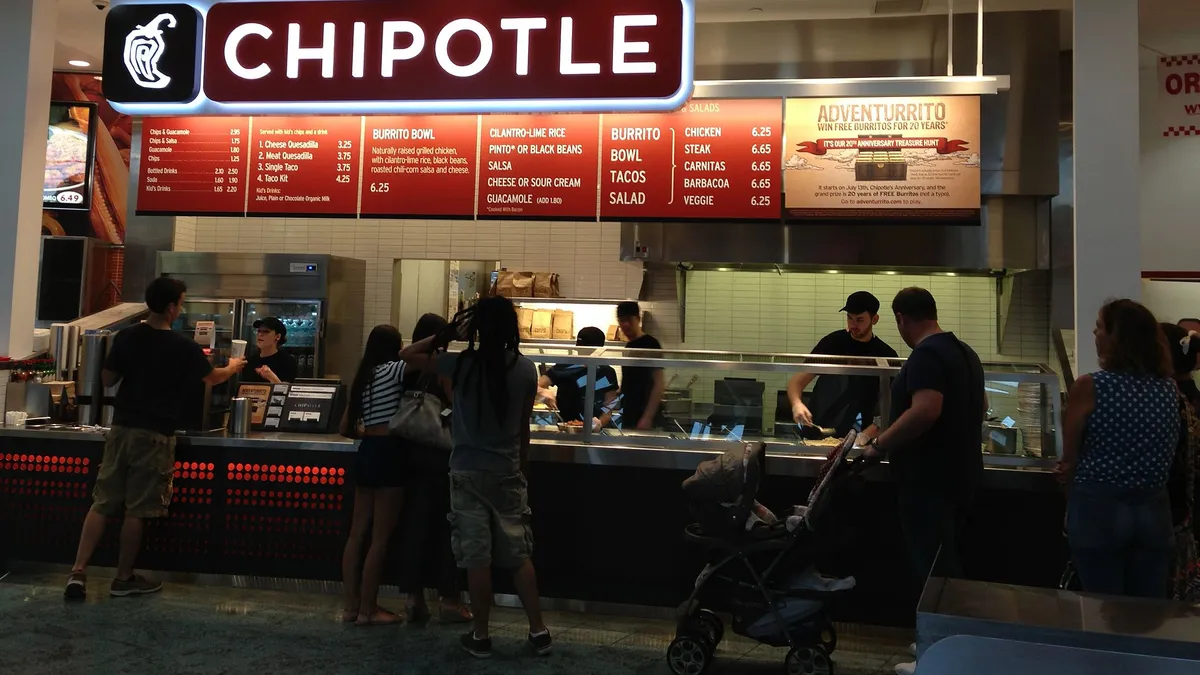Dive Brief:
- Chipotle has rehired a previously fired manager at one of its St. Paul, Minnesota, restaurants after an incident last week in which the manager insisted that a group of young black men prepay for their meals, according to several reports.
- The Nov. 15 incident, in which the men refused to prepay, was captured in a series of videos posted to Twitter by one of the men, the St. Paul Pioneer Press reported. In a statement to the Pioneer Press, Chipotle said the same restaurant had experienced a separate incident just days before in which a group of customers wasn't able to pay and that the manager thought the men visiting Nov. 15 were the ones involved in the previous incident. "Regardless, this is not how we treat our customers and as a result, the manager has been terminated and the restaurant is being retrained to ensure something like this doesn't happen again," Chipotle said in the statement.
- By Monday, however, Chipotle decided to rehire the fired manager, the Pioneer Press reported. On Sunday, the employer told the Pioneer Press that it had "additional information which needs to be investigated further," and that it would "re-train and re-hire if that facts warrant it." Chipotle Chief Communications Officer Laurie Schalow told The Washington Post that the company had offered the manager her job back based on its review of the situation and apologized to the manager, but did not specify what information motivated its decision. According to the Post, the same man who posted videos of the Nov. 15 incident appeared to talk about "dining and dashing" at Chipotle and other restaurants in previous tweets. A Chipotle representative told the Pioneer Press that the company was aware of those tweets before deciding to fire the manager.
Dive Insight:
The Nov. 15 incident sparked extensive discussion on Twitter and elsewhere, both before and after the manager's apparent rehiring, about the impact of bias and whether it played a role in the Chipotle manager's decision to require the customers to prepay for the food.
Several outlets, including the Post, drew comparisons between the Chipotle incident and the fallout of an April incident at a Philadelphia Starbucks, in which a manager called the police on two black men waiting in the coffee shop. Starbucks later closed all of its U.S. stores for a day of racial-bias training. The circumstances of both incidents differ, however.
For HR professionals, the Chipotle incident is a case study in responding to incidents involving public-facing employees. Schalow told the Post in her statement in part that, "our normal protocol was not followed serving these customers," without getting into specifics as to what company policies were or were not followed by restaurant staff. Across industries, front-line managers can play a critical part in ensuring that protocols are followed and organizational values are represented.
Likewise, training can only take an organization so far in preventing unconscious bias from impacting day-to-day operations, experts have previously told HR Dive. HR leaders may need to sharpen recruiting processes and engage in reinforcement of bias prevention through structured policies that are well-communicated and made known throughout the organization.












